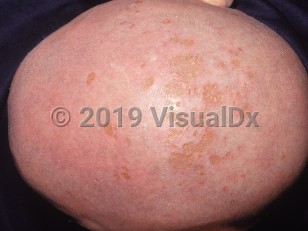The typical patient is a socially isolated middle-aged to elderly female, although delusions of parasitosis can affect both sexes and all ages. The condition has also been linked to polypharmacy (>5 drugs) and specific drugs, such as those that treat attention deficit hyperactivity disorder, selective serotonin reuptake inhibitors, gabapentin and opioids, in a small study. Renal failure in the setting of polypharmacy leads to decreased clearance of medications, and may be an additional predisposing factor.
Patients will often appear anxious and overwhelmed. Skin lesions, when present, are self-induced with the fingernails or other implements. The clinician should be aware of the "matchbox sign" – patients will often bring lint, pieces of skin, and other debris to an office visit in plastic wrap or matchboxes, claiming that these items represent evidence of parasitic infection. Even though these collections contain no parasites, the patient believes that they represent organisms, pieces of organisms, ova, or larvae.
There are several variations of this disorder:
- Folie à deux ("a madness shared by two") – when a delusion of infestation has been transmitted to a significant other.
- Folie à famille ("family madness") – when a delusion of infestation has been transmitted within a family to more than 2 members.
- Firm belief that a spouse, child, or pet is infested.



